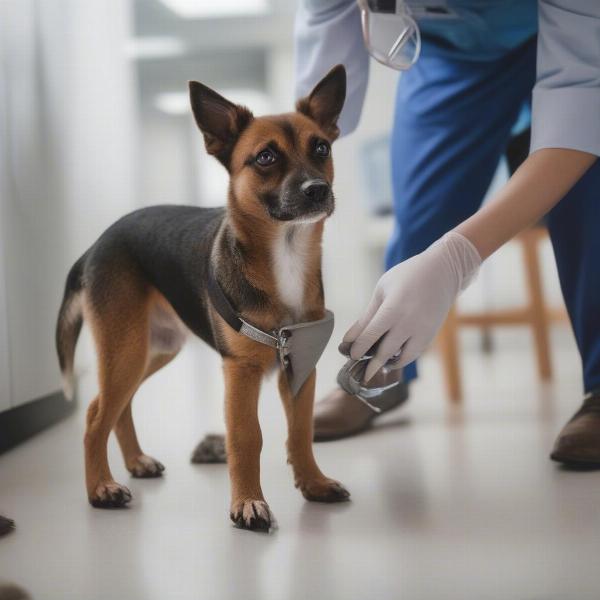Puppy pads are a common sight in homes with new puppies or senior dogs. While they serve a necessary purpose, many dog owners worry about their furry friend ingesting them. So, is it dangerous for dogs to eat puppy pads? The short answer is: it can be. While a small nibble might not cause immediate harm, regularly consuming puppy pads can lead to serious health issues.
While most puppy pads are non-toxic, they are not digestible. This means they can’t be broken down in your dog’s stomach like regular food. If your dog eats enough puppy pad material, it can create a blockage in their digestive system, leading to vomiting, diarrhea, lethargy, loss of appetite, and abdominal pain. In severe cases, surgery might be required to remove the blockage.
Why Do Dogs Eat Puppy Pads?
Understanding why your dog is attracted to puppy pads can help you address the root cause and prevent future incidents. Several factors can contribute to this behavior:
- Curiosity: Puppies, especially, explore the world with their mouths. Everything is new and interesting, and a puppy pad might seem like another chew toy.
- Teething: Puppies experiencing teething discomfort might chew on puppy pads to relieve the pain and pressure on their gums.
- Boredom or Anxiety: Dogs left alone for extended periods might engage in destructive behaviors, including chewing on inappropriate items like puppy pads. Anxiety can also manifest as destructive chewing.
- Hunger: In rare cases, extreme hunger can drive a dog to eat anything, including puppy pads.
- Scent: The attractant scent in some puppy pads can entice dogs to chew and ingest them.
Preventing Puppy Pad Consumption
The best way to deal with this issue is prevention. Here are some effective strategies:
- Supervision: Especially with puppies, closely monitor them when they are near puppy pads.
- Training: Consistent potty training is crucial. Reward your dog for using the puppy pad correctly.
- Provide Appropriate Chew Toys: Offer a variety of safe and engaging chew toys to redirect your dog’s chewing instincts.
- Address Boredom and Anxiety: Ensure your dog receives adequate physical exercise and mental stimulation. Consider crate training or providing puzzle toys.
- Change Pad Placement: Try moving the puppy pad to a less accessible location or using a holder designed to keep the pad in place.
- Choose Unscented Pads: Opt for unscented puppy pads to minimize attraction.
- Bitter Apple Spray: Spraying the edges of the puppy pad with a bitter apple spray can deter chewing.
What to Do If Your Dog Eats a Puppy Pad
If you suspect your dog has eaten a puppy pad, contact your veterinarian immediately. They will advise you on the best course of action based on your dog’s size, breed, and the amount of material ingested. Do not induce vomiting unless specifically instructed by your vet.
When to Seek Veterinary Attention
 Dog at Vet Clinic
Dog at Vet Clinic
Watch for these signs and seek immediate veterinary care if your dog exhibits any of the following:
- Vomiting
- Diarrhea
- Lethargy
- Loss of appetite
- Abdominal pain or distension
- Straining to defecate
- Changes in behavior
“If your dog ingests a foreign object, like a puppy pad, early intervention is key,” says Dr. Emily Carter, DVM. “Don’t hesitate to contact your vet, even if your dog isn’t showing immediate symptoms.” Prompt treatment can significantly improve the outcome and prevent potentially serious complications.
Conclusion
While puppy pads are a useful tool for house training, it’s essential to prevent your dog from eating them. By understanding the reasons behind this behavior and implementing preventative measures, you can protect your furry friend from potential health risks. If your dog does ingest a puppy pad, contact your veterinarian immediately.
FAQ
- Are all puppy pads toxic to dogs? Most puppy pads are non-toxic, but they are not digestible and can cause blockages.
- Can a small piece of puppy pad hurt my dog? A small nibble is unlikely to cause serious harm, but consistent ingestion can be dangerous.
- What are the signs of a blockage? Vomiting, diarrhea, lethargy, loss of appetite, and abdominal pain.
- What should I do if my dog eats a puppy pad? Contact your veterinarian immediately.
- How can I prevent my dog from eating puppy pads? Supervision, training, appropriate chew toys, and addressing boredom and anxiety.
- Are there alternative solutions to puppy pads? Consider crate training, frequent potty breaks, and enzymatic cleaners for accidents.
- Can I use bitter apple spray on puppy pads? Yes, it can deter chewing, but always test a small area first.
ILM Dog is a leading international online resource for dog care and training. We provide expert advice and practical tips on everything from breed selection to health care, nutrition, and behavior. Whether you’re a new puppy parent or a seasoned dog owner, ILM Dog is your trusted source for reliable information. For expert advice and personalized support, contact us at [email protected] or +44 20-3965-8624. Visit us at ILM Dog for more valuable insights and resources.